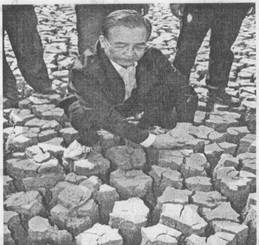题目内容
The Guangxi Zhuang autonomous region _______ $ 1.59 billion worth of trade with the Association of Southeast Asian Nations in the first two months of this year.
- A.has seen
- B.saw
- C.had seen
- D.sees
试题分析:考查时态。本题考查的是一般过去时陈述过去所发生的事情,不强调对现在产生的影响;本题容易错选A项,现在完成时强调过去所发生的事情对现在的影响,在本题的上下文中看不出来这一点。句意:广西壮族自治区,在今年前两个月里见证了和东盟的15.9亿美元的贸易往来。故B正确。
考点:考查时态
点评:现在完成时和一般过去时的区别是时态题考查的重点内容,现在完成时表示过去发生的事情对现在的影响,或者过去发生的事情延续到现在;而一般过去时只表示过去发生过某件事情,不表示对现在的影响。

 每日10分钟口算心算速算天天练系列答案
每日10分钟口算心算速算天天练系列答案China has input several billion yuan of money to stop the dirty water waste on the upper and middle area of the Pearl River from polluting the lowe r reaches of the river, especially the Macao Special Administrative Region.
r reaches of the river, especially the Macao Special Administrative Region.
The Guangxi Zhuang Autonomous Region in the upper and middle reaches of the Pearl River has been rapidly urbanized(城市化)and industrialized in recent years, leading to a rise in the amount of urban rubbish to the damage of the land, rivers and atmosphere.
Refuse dumps and special plants in most cities treat rubbish to make it harmless, with 5,800 tons of wastes being burnt, buried or made into fertilizers on a daily basis.
He Suping, a woman engineer with the water resources department in Guangxi said, it is imperative for the autonomous region to treat sewage wastes to protect the area’s Karst terrain(喀斯特地形)and rain water which brings contact between groundwater and surface water, making groundwater more easily polluted.
The Xijiang River, a branch of the Pearl River which runs from Guangxi to neighboring Guangdong Province, provide s fresh water for a n
s fresh water for a n umber of riverside cities such as Macao, Zhuhai, Zhongshan and Zhaoqing, so Guangxi must begin to treat rubbish quickly to protect the water sources, said Liu Chen, a senior engineer with the Ministry of Water Resources.
umber of riverside cities such as Macao, Zhuhai, Zhongshan and Zhaoqing, so Guangxi must begin to treat rubbish quickly to protect the water sources, said Liu Chen, a senior engineer with the Ministry of Water Resources.
The government 2001—2006 plan to spend billions of yuan to turn wastes harmless has been mainly provided by national debt payments and overseas investment.So far wastes treatment projects have received a total of 400 million yuan(48 million US dollars)from national debts and 60 million yuan(7.22 million US doll ars)from overseas loans(贷款).
ars)from overseas loans(贷款).
【小题1】The main idea of the passage is __
A.A large number of waterways have been polluted in China up to now. large number of waterways have been polluted in China up to now. |
| B.Guangxi and Guangdong have taken the lead in making water clean. |
| C.China's rivers are badly in need of improvement. |
| D.China is making efforts to reduce pollution of the rivers. |
| A.The government has no ability to afford the expenses of treating wastes. |
| B.The government has a long-term plan to treat wastes. |
| C.National debt payments and overseas investment are taking an important part in developing China's economy. |
| D.A great deal of money is needed in dealing with wastes. |
| A.the improvement of people’s living standard |
| B.people’s wasting too much |
| C.urbanization and industrialization |
| D.too many tourists’ coming |
 means _______.
means _______.| A.unnecessary | B.important | C.easy | D.unbelievable |
